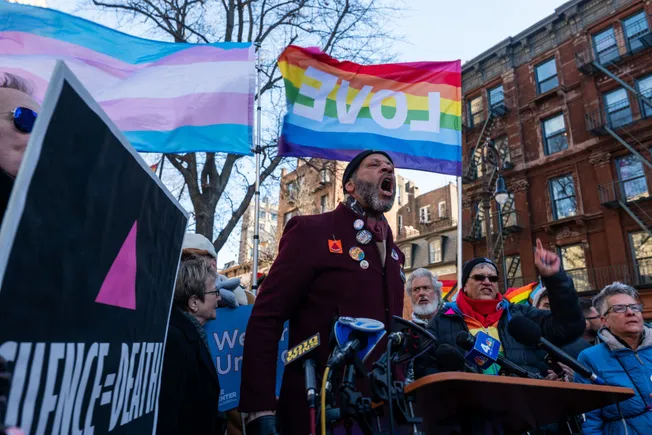April 2025 data from digital platform WorkL indicates that while workplace happiness increased slightly for heterosexual workers in 2025, it decreased for LGBTQ+ workers — suggesting a change in the political climate also led to a change in climate for LGBTQ+ workers.
Similarly, feelings of empowerment for these workers fell from 77% to 71% year over year and pride in their work dropped from 74% to 63%. Job satisfaction for LGBTQ+ workers also dropped from 75% to 64%.
WorkL’s findings are just a continuation of trends regarding LGBTQ+ people at work: Job satisfaction is down, discrimination is up, and worker well-being is in critical condition.
Where the legal landscape meets workplace culture
State legislatures introduced more than 530 bills targeting LGBTQ+ people in 2024, according to a March 2025 report from the Center for American Progress. Because of the current “environment that increasingly politicizes the rights and dignity of LGBTQI+ people, it is crucial to ascertain how discrimination and stigma continue to affect the community,” CAP researchers said.
Nearly 1 in 4 LGBTQI+ people told CAP they had experienced discrimination at work. CAP also gathered data specifically about the precautions LGBTQ+ people take to avoid discrimination — including being selective about where to work.
While 40% of LGBTQI+ people said they “made specific decisions” about where to work, that percentage rose for certain groups. Forty-eight percent of LGBTQI+ disabled people told CAP they were more choosy about their employer, while 56% of intersex people and a whopping 63% of trans people said the same.
Why it should matter to HR
Many LGBTQI+ respondents to CAP’s survey also reported the high levels of physical and mental wear and tear due to ongoing discriminatory treatment.
Compared to 29% of LGBTQI+ respondents on average:
- 35% of disabled people said discrimination affected their physical health “moderately or more”
- 49% of intersex people said discrimination affected their physical health “moderately or more”
Compared to 52% of LGBTQI+ respondents on average:
- 69% of intersex people said discrimination affected their mental health “moderately or more”
- 74% of trans people said discrimination affected their mental health “moderately or more”
Since the onset of the COVID-19 pandemic, worker mental health has been a big part of the HR conversation. Research shows time and again that an employer that tends to workplace well-being will retain workers in the long run.
As recently as last fall, 56% of HR leaders surveyed by HR systems provider Aconso told the company that employee well-being was a critical long-term consideration; still, even more reported that they felt constrained by company budgets.
Emphasizing the importance of inclusion — and the avoidance of discrimination, per the Civil Rights Act — is one small thing employers can do to improve LGBTQ+ well-being.
The majority of LGBTQ+ workers surveyed by HRC last year said they would feel less included if their company scaled back its DEI commitments and at least 1 in 5 said they would either quit or seek out a new job.
This reflects WorkL’s research suggesting that LGBTQ+ talent are an increased flight risk: 36% are considering leaving their jobs in 2025. This is up from 21% last year, and a global average in the low-20% range.
“Inclusive and supportive workplaces are essential for creating productivity and innovation,” said Mark Price, founder of WorkL and a member of the United Kingdom’s House of Lords, in a statement sent to HR Dive. “This growing inequality should serve as a wake-up call for businesses to strengthen their DEI commitments, not reverse them.”






Leave a Reply